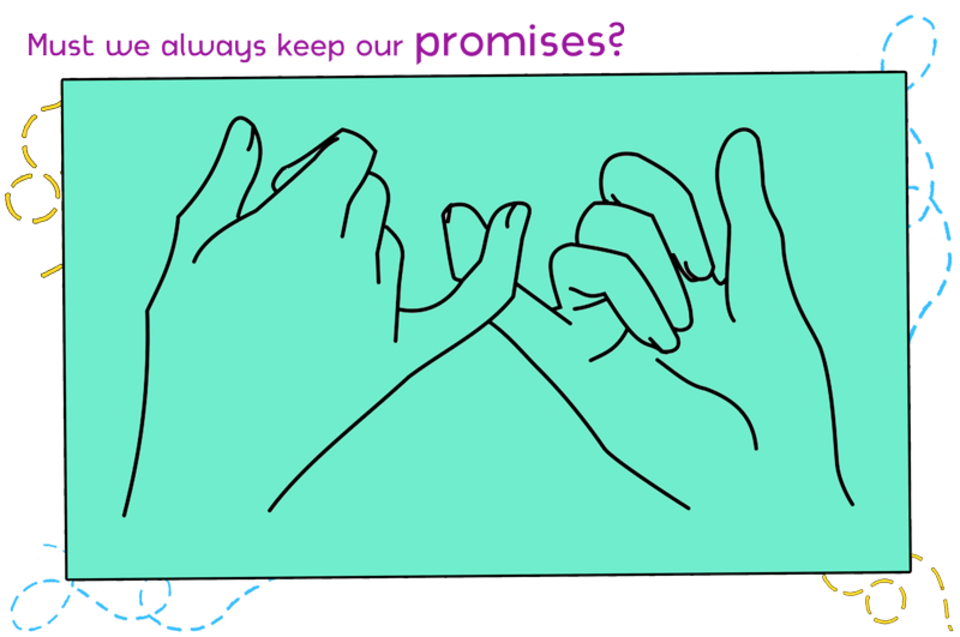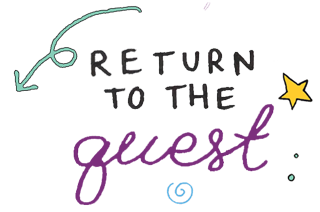
The tongue-twisting promise
| Objective: To wake up your creative and thinking energy by repeating a tongue-twisting promise! |
Duration: 1 to 15 minutes
Material:
- Your body and mind
- Sheet of paper, coloured pencils
Instructions:
- Warm up. Your mission will be to create your own tongue twister, but before you start, warm up your tongue with the following suggestions. Repeat each sentence several times, trying not to trip over the words!
- Black background, brown background, brown background, black background.
- She sells sea shells by the seashore. She sells sea shells by the seashore.
- How much wood would a woodchuck chuck, if a woodchuck could chuck wood?
- Create your tongue-twisting promise. Now that your tongue has warmed up its twisting muscles, it's time for you to create your own tongue twister. But wait! In this tongue twister, you must make a promise... to yourself! Hmm... but is it even possible to make a promise to yourself? Before creating your own tongue twister, ask yourself: What is a promise?
Tip: To create your tongue twister, start by thinking of a promise you would like to make to yourself, such as finishing an artwork or having more self-confidence. Then think of different words that you could use to make a sentence that would be hard to pronounce! You may have noticed that the tongue twisters you used to warm up include words with similar syllables or sounds that mix and get tangled in your mouth. So to make your tongue-twisting promise, try to find words that sound similar to each other. You can use a dictionary of synonyms to help you. For example, the two promises mentioned above as examples could become: “scrape your skull and sculpt scrupulously” and “with will, all walls will wail.” Don't hesitate to test different ways to phrase these by trying to say them out loud! - Say your promise. When your tongue-twisting promise is ready, repeat it out loud several times. You can also write your tongue-twisting promise on a piece of paper and post it on your wall. This way you will be able to remember your promise as you practice saying it every day!
- Think about your experience. Why did you choose to make this promise to yourself? What is the difference between a promise to yourself and a goal? Is your promise as difficult to keep as it is to pronounce? Do you have to keep your promise even if you struggle? Do you always have to keep your promises?
...
Bonus: What about the promises we make to other people? You may have heard the phrase "cross my heart and hope to die." We use it to mean that we promise something as strongly as possible. Hmm... are some promises stronger than others? What are the criteria for assessing the strength of a promise? Should we consider what is being promised... as well as the person who is making the promise? To continue your creative thinking, imagine a trophy that could be given to the strongest of all promises. What could this trophy look like and what might be the criteria to win it? |

| Tricks for tots: The phrase "cross my heart and hope to die" refers to a time when it was common to cross your hands over your chest and to point to the sky to show how serious you were when making a promise. Do you know any other gesture used to seal a promise? Another example is the pinky promise, in which two people make a promise by locking their pinkies together. This gesture is said to have originated in Japan, where it is called the yubikiri, or "severed finger!" Originally, if you betrayed the person to whom you had made a promise, that person could cut off your little finger! Ouch! How bad is it to break a promise? If you don't keep a promise, should there be consequences? Why or why not? Invite another person to think about these questions with you. In light of your answers, invent your own gesture to seal a promise! |
Tips for teens: "As President, I will...": this is the turn of phrase chosen by former French President François Hollande to convince voters to vote for him. By repeating this phrase fifteen times, he made fifteen promises about what he would do if he were elected president. These promises helped him get elected... but he was also often reminded of these commitments during his term, and was criticized for not keeping some of them. “Election promises" are the promises politicians make to get elected. But many people don't really believe in these kinds of promises, because they feel that politicians are willing to promise anything to get elected, knowing full well that nothing will force them to keep their promises once they are in power. Nevertheless, in recent years, there have been initiatives to make politicians accountable to their people, such as websites that list all the election promises made by a politician and assessing the efforts made to keep each of them. This raises important questions: Should public figures who make promises be held accountable for them? Can it be justified to lie to citizens in order to gain power... or for any other reason? Can it be justified to make a promise even if you know you cannot keep it? Why or why not? |
Share your creative reflections by sending them via email.
Include photos of your projects and notes of your thoughts, as well as your first name and your age!


